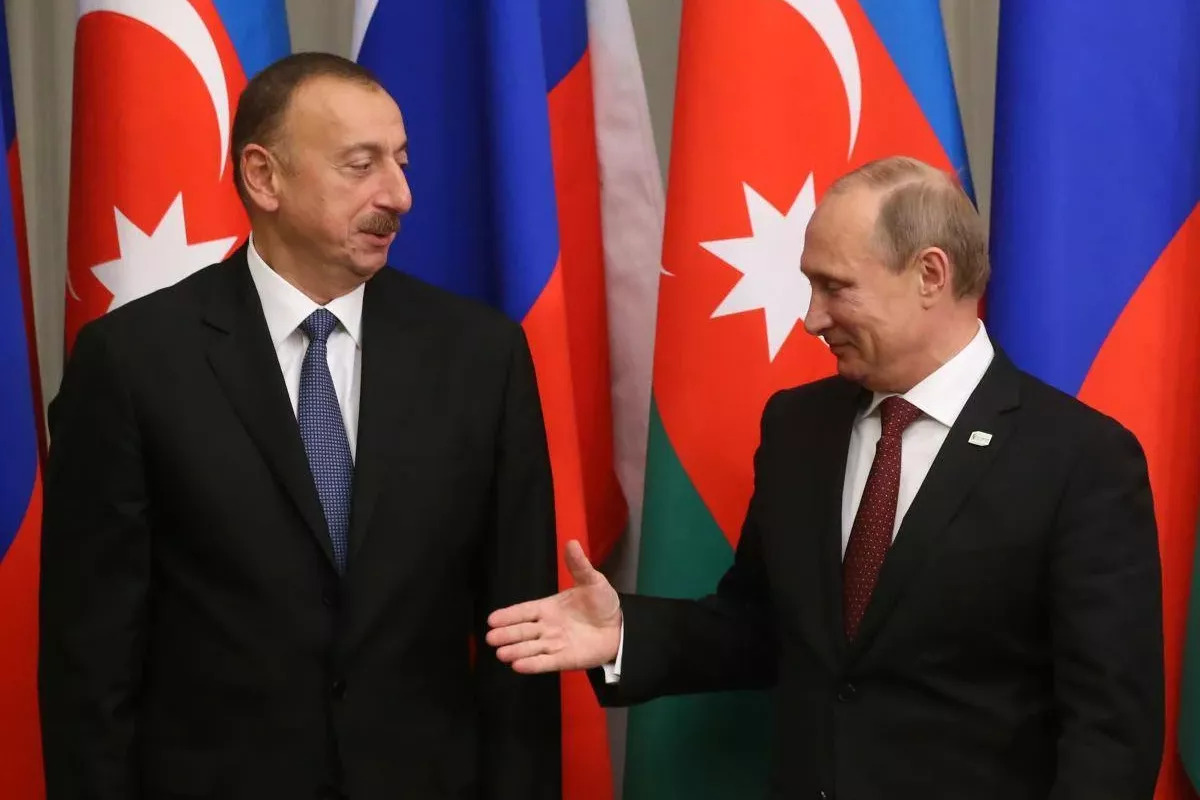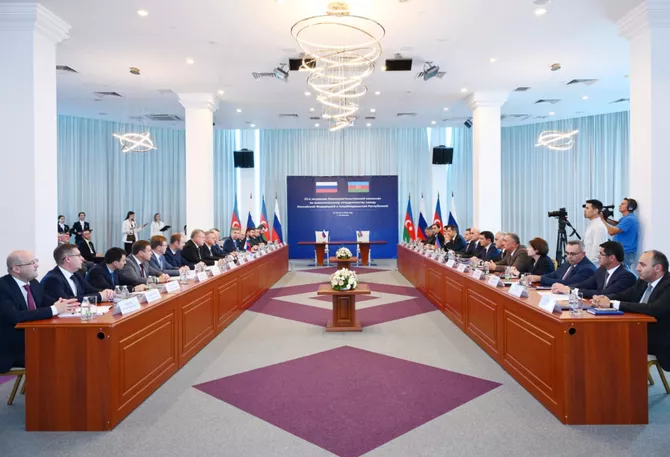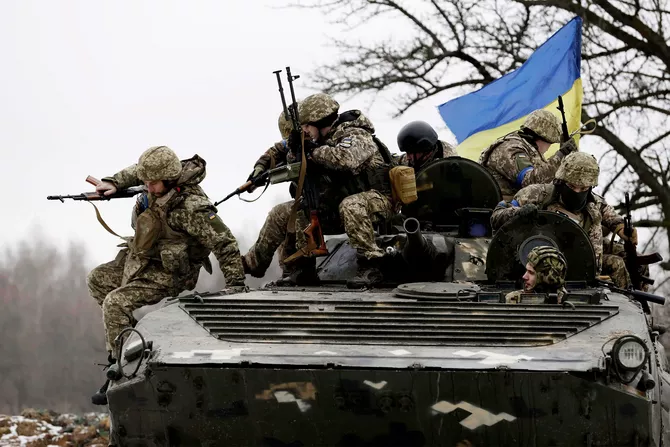
Relations between Azerbaijan and Russia have always been a delicate balancing act, shaped by geography, history, and shifting global dynamics. In recent months, however, this relationship has shown visible strain. Political disagreements, diverging foreign policy orientations, and the shadow of Moscow’s confrontation with the West have created a perception that Baku and Moscow are moving further apart. Yet, as so often happens in international politics, signals emerge suggesting that both sides are searching for ways to recalibrate their interaction rather than allow ties to unravel completely.
One such signal came not through high-level political negotiations but in a more symbolic gesture: Russian President Vladimir Putin’s birthday congratulations to Azerbaijan’s First Vice President Mehriban Aliyeva. While at first glance this might seem like a routine courtesy, the details reveal a deeper layer. Putin extended his wishes on August 22, even though Aliyeva’s birthday falls on August 26. He also added a personal touch, asking her to “pass greetings to Ilham Heydarovich and all members of the family.” In diplomacy, such details are rarely accidental - they are calculated gestures meant to convey warmth and, more importantly, an invitation to keep communication open.

The timing was no coincidence. That same day, in Astrakhan, the 23rd session of the Russian-Azerbaijani Intergovernmental Commission on Economic Cooperation convened. Bringing together over 40 representatives from ministries, customs authorities, and banks from both countries, the meeting was a reminder that politics may ebb and flow, but economics often continues on a more pragmatic trajectory. Astrakhan, with its unique role as a symbolic and practical bridge, served once again as the venue for reconnecting the threads of partnership.
Astrakhan has long been at the center of Azerbaijani soft power efforts in Russia. The Heydar Aliyev Foundation has invested heavily in the region, financing the renovation of School No. 11, which bears the name of the late Azerbaijani leader, the construction of a kindergarten, and the opening of the Azerbaijani Business Center. These cultural and humanitarian projects are not just gestures of goodwill - they are a way to anchor Azerbaijan’s presence in a strategically important region on the Caspian coast. In turn, Astrakhan has responded with its own contributions, including the construction of a kindergarten in Azerbaijan’s Gubadli district. This mutual investment has created a unique channel of diplomacy that operates somewhat independently of larger geopolitical storms, making Astrakhan a quiet yet significant communicator between Moscow and Baku.
The Astrakhan meeting was not merely symbolic; it was substantive. Russian Deputy Prime Minister Alexey Overchuk highlighted areas of priority such as enhancing transport connectivity in the region, developing independent financial mechanisms for bilateral trade, and strengthening cooperation in energy, shipbuilding, and agriculture. Azerbaijan’s Deputy Prime Minister Shahin Mustafayev echoed this spirit, underlining Baku’s readiness to deepen collaboration across all sectors. The session concluded with a signed protocol that reaffirmed both countries’ commitment to pragmatic cooperation, even as political relations remained complicated.
Economic realities explain this pragmatic approach. According to official data, bilateral trade between Azerbaijan and Russia rose by 19.3 percent in the first half of 2025, with Russia entering the top three of Azerbaijan’s most important trading partners. For Russia, struggling under the weight of unprecedented Western sanctions, Azerbaijan is not just a neighbor but a critical logistical hub. The International North-South Transport Corridor, which passes through Azerbaijani territory, is increasingly important to Moscow’s efforts to access markets in the Persian Gulf, South Asia, and beyond. For Baku, maintaining economic ties with Russia ensures access to a large market, preserves a degree of balance in its foreign policy, and provides leverage in navigating its own complex regional challenges.
The significance of the Astrakhan meeting became even clearer the following day when Azerbaijani Foreign Minister Jeyhun Bayramov spoke by phone with his Russian counterpart Sergey Lavrov. According to Baku’s Foreign Ministry, the ministers discussed bilateral and multilateral issues, economic and humanitarian cooperation, and regional security. Importantly, they both praised the results of the Astrakhan commission. This sequence - Putin’s personal gesture, the commission’s successful session, and the ministerial phone call - forms a coherent pattern. It signals not a sudden rapprochement, but a carefully calibrated effort to manage tensions and prevent relations from deteriorating further.
A relationship shaped by history and necessity
To understand why such gestures matter, one must recall the historical depth of Azerbaijani-Russian relations. Azerbaijan spent much of the 19th and 20th centuries under Russian and then Soviet rule, an experience that left both trauma and interdependence. After independence in 1991, Azerbaijan charted its own path, but geography has always imposed constraints. Russia remains a neighbor, a major power in the Caucasus, and a player with both the means and the will to influence developments in the region.
At the same time, Azerbaijan has steadily diversified its foreign policy. Its strategic energy partnerships with Türkiye and the European Union, its growing role in the Middle Corridor linking Europe and Asia, and its increasing cooperation with China are all signs that Baku seeks a truly multi-vector approach. This naturally creates frictions with Moscow, which often views the South Caucasus through a zero-sum lens. Yet, what Astrakhan showed is that even as Azerbaijan broadens its horizons, it cannot afford - nor does it desire - to sever ties with Russia altogether.

Geopolitics at play
The geopolitical context makes this recalibration even more urgent. Russia’s war in Ukraine has weakened its influence in the South Caucasus, creating space for greater Western engagement. At the same time, Armenia’s drift toward the West has left Moscow searching for ways to retain leverage in the region. For Russia, Azerbaijan represents both a challenge and an opportunity. On the one hand, Baku’s close partnership with Türkiye and its growing energy ties with Europe complicate Moscow’s strategic calculus. On the other hand, Azerbaijan’s geographic position and pragmatic diplomacy make it a potential partner in keeping regional connectivity projects - such as the North-South Corridor - viable.
For Azerbaijan, the calculus is equally nuanced. Baku values its independence and has little interest in becoming entangled in Russia’s conflicts with the West. Yet, it understands that maintaining stable ties with Moscow is essential for managing security dynamics in the Caucasus, especially when it comes to Armenia and the unresolved complexities of the post-Karabakh landscape. The Astrakhan session, in this light, can be seen as a recognition by both sides that pragmatism must take precedence over ideological posturing.
Looking ahead
The real question now is whether these signals will culminate in a more structured dialogue at the leadership level. Later this month, the Shanghai Cooperation Organization summit in Tianjin will provide such an opportunity. Both Ilham Aliyev and Vladimir Putin are expected to attend, and the possibility of a bilateral meeting on the sidelines cannot be dismissed. If it takes place, it could offer clarity on whether the tentative thaw glimpsed in Astrakhan is sustainable or merely tactical.
Ultimately, the events of late August illustrate a broader truth: Azerbaijan and Russia are bound not by friendship or trust, but by a mix of geography, economics, and necessity. Their relationship is one of managed pragmatism, where gestures - like an early birthday message - and forums - like the Astrakhan commission - play a disproportionate role in keeping communication alive.
For Baku, the priority is to maintain balance: deepen ties with Türkiye, expand trade with Europe and Asia, and engage with China, all while preventing open conflict with Moscow. For Russia, the challenge is to accept that Azerbaijan is no longer a passive partner but an assertive regional power in its own right.
In the end, whether relations stabilize or deteriorate will depend less on rhetoric and more on whether both sides can continue to prioritize their mutual interests over their differences. The Astrakhan meeting suggests that, at least for now, pragmatism still prevails.
By Asif Aydinli
Share on social media